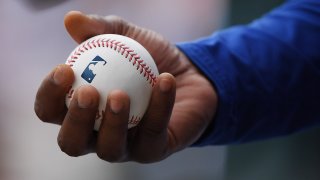
MLB sticky stuff crackdown: What fans need to know originally appeared on NBC Sports Chicago
Starting Monday, we may have some sticky situations on our hands across Major League Baseball.
Monday marks the beginning of MLB’s crackdown on foreign substance usage, i.e. “sticky stuff.” The league announced increased enforcement of rules 3.01 and 6.02(c) and (d), which prohibit applying foreign substances to the baseball, following complaints from players, coaches and executives across the game.
But what does that even mean, and what does it even entail? Glad you asked.
Feeling out of the loop? We'll catch you up on the Chicago news you need to know. Sign up for the weekly Chicago Catch-Up newsletter here.
Here’s what you need to know as the crackdown goes into effect.
Why is MLB cracking down on sticky stuff now?
Good question. The rules aren't new. But, before the season, MLB announced a plan to quantify the effects of foreign substances.
MLB unveiled a data-collection process to all 30 teams in March entailing daily dugout and clubhouse monitoring, video review, Statcast analysis on spin rate, and the collection of balls taken out of play.
According to MLB, that process revealed evidence of foreign substances in the game. Further third-party research showed foreign substances increase spin rate and movement on the baseball, the league said.
When will sticky stuff inspections occur?
Umpires will inspect every pitcher to take the mound for foreign substances. Generally, inspections will come between innings or after a pitching change to avoid game delays.
Starting pitchers will be inspected at least twice a game. Relievers will be inspected either at the end of their inning or when they are removed, depending which occurs first — except for the ninth inning.
How that process will work if a reliever isn’t inspected at the end of an inning but is removed for a pinch hitter promises to be interesting.
But umpires can inspect a pitcher at any moment, if they notice a sticky feeling on the baseball — or a pitcher going to their uniform or body, namely their belt, glove and hat — to apply what could be a foreign substance.
How will umpires inspect pitchers for sticky stuff?
Umpires inspections will include the pitcher’s hat, glove and fingertips.
Are sticky stuff inspections exclusive to pitchers?
Nope! Catchers will also be subject to routine inspections. In fact, any position player may be inspected, if they exhibit behavior consistent with foreign substance use.
How will players be punished for using sticky stuff?
This is the big question. A player found to apply a foreign substance to the baseball will be ejected and suspended for 10 games. Repeat offenders will be subject to further discipline. Teams can’t replace that player on their active roster, either.
If a position player is found to apply sticky stuff to the baseball, they and the pitcher will be ejected and automatically suspended. Pitchers are ultimately still responsible for the balls they throw.
But position players found with a foreign substance on their glove or uniform will not be ejected, unless the umpire determines they applied it to the baseball to help their pitcher.
What if players refuse to be inspected?
Players who don’t cooperate with an inspection will be presumed guilty and consequently ejected and suspended.
Are rosin bags still allowed?
Yep, but teams have to submit them to umpires, along with game balls, for review before each game.
Who else can be punished for sticky stuff?
Team personnel are subject to fines or suspensions if they handle foreign substances, assist players in using them, interfere with the collection of baseballs or fail to report any violations.
Got all that? Let’s play (sticky-free) ball.




